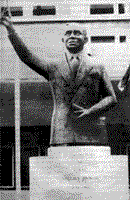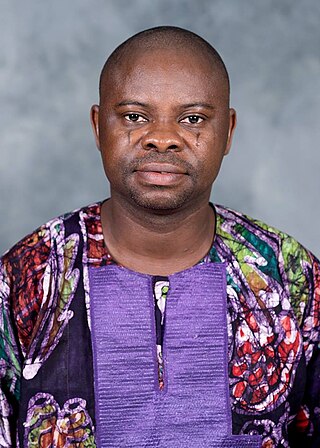Related Research Articles

Isaac Theophilus Akunna Wallace-Johnson was a Sierra Leonean, British West African workers' leader, journalist, activist and politician.
Dr. Oyeleye Oyediran is a noted Nigerian political scientist. A former Fulbright scholar, and a native of Ogbomosho in Oyo State, he has edited books like, Nigerian Government and Politics Under Military Rule, 1966-1979 and Survey of Nigerian Affairs, 1973-1977 and 1978-1979. He has remained a faculty at the Center for International Studies, at the East Carolina University, and Senior Fellow at the United States Institute of Peace, (1999–2000).

Women in Nigeria are a diverse group of individuals who have a wide range of experiences and backgrounds. They are mothers, daughters, sisters, wives, entrepreneurs, professionals, and activists. Women in Nigeria face numerous challenges, including gender inequality, poverty, and a lack of access to education and healthcare. Despite these challenges, Nigerian women are making strides in all areas of life and are becoming increasingly empowered to take control of their lives and their futures.
Prostitution in Nigeria is illegal in all Northern States that uses the penal code. In Southern Nigeria, the activities of pimps or madams, underage prostitution and the operation or ownership of brothels are penalized under sections 223, 224, and 225 of the Nigerian Criminal Code. Even though Nigerian law does not legalize commercial sex work, it is vague if such work is performed by an independent individual who operates on his or her own accord without the use of pimps or a brothel.
The West African Youth League (WAYL) was a political organisation founded by I. T. A. Wallace-Johnson in June 1935. The group was a major political force against the colonial government in West Africa, especially in the Gold Coast and Sierra Leone. The League was the first political movement in the region "to recruit women into the main membership and the decision-making bodies of the organisation".
The International African Service Bureau (IASB) was a pan-African organisation founded in London in 1937 by West Indians George Padmore, C. L. R. James, Amy Ashwood Garvey, T. Ras Makonnen and Kenyan nationalist Jomo Kenyatta and Sierra Leonean labour activist and agitator I. T. A. Wallace-Johnson. Chris Braithwaite, was Secretary of this organisation.

The National Archives of Nigeria has its headquarters in Abuja, Nigeria, with branches in Enugu, Ibadan, and Kaduna. As of 2017, the current Director of Archives is Mr. Danjuma Dambring Fer.
The following is a timeline of the history of the city of Freetown, Sierra Leone.
The following is a timeline of the history of the city of Ibadan, Oyo State, Nigeria.

Folayegbe Akintunde-Ighodalo was a Nigerian civil servant and activist. She was the first Nigerian woman to become a Permanent Secretary in Nigeria, on April 3, 1968.

Ada Priscilla Nzimiro was a trained medical doctor with family roots in Oguta, present-day Imo State. She attended the University of Glasgow and earned her Bachelor of Medicine, Bachelor of Surgery in 1950. She was the first woman from Igboland to graduate as a medical doctor. Nzimiro is said to have died an unnatural death a year after she graduated.

Saheed Aderinto is a Nigerian American Professor of History and African and African Diaspora Studies at Florida International University and an award-winning author. He is the Founding President of the Lagos Studies Association. In February 2023, Aderinto received the $300,000 Dan David Prize–the largest financial reward for excellence in the historical discipline in the world. He has published eight books, thirty-six journal articles and book chapters, forty encyclopedia articles, and twenty book reviews.
Philip Aigbona Igbafe was a Nigerian historian, professor and public administrator noted for his work on the history of the Edo people of the precolonial Kingdom of Benin. He belonged to the Ibadan History School and his major works examine the motives for colonialism and highlight the political, social and economic consequences of British rule for the African kingdom.

Folake Oritsegbubemi Onayemi was a Nigerian literary scholar. She was Professor of Classics and served as Head of the Department of Classics at the University of Ibadan in Nigeria. She was the first woman to be awarded a PhD in Classics in Nigeria and the first black woman to be a Professor of Classics in sub-Saharan Africa. She was an expert on comparative Greco-Roman and Nigerian literature, cultures, and mythology, particularly relating to the roles and representations of women.
Abosede George is the Tow Associate Professor of History at Barnard College and Columbia University in New York. She teaches courses on African migrations, historical mapping, urban history, African history, childhood and youth studies, girl studies, women's studies, and migration studies gender, and sexuality in African History. She is the incumbent President of the Nigerian Studies Association, an affiliate organization of the African Studies Association.

Slavery has existed in various forms throughout the history of Nigeria, notably during the Atlantic slave trade and Trans-Saharan trade. Slavery is now illegal internationally and in Nigeria. However, legality is often overlooked with different pre-existing cultural traditions, which view certain actions differently. In Nigeria, certain traditions and religious practices have led to "the inevitable overlap between cultural, traditional, and religious practices as well as national legislation in many African states" which has had the power to exert extra-legal control over many lives resulting in modern-day slavery. The most common forms of modern slavery in Nigeria are human trafficking and child labor. Because modern slavery is difficult to recognize, it has been difficult to combat this practice despite international and national efforts.
Phanuel Egejuru is a Nigerian writer and academician, whose areas of focus are composition, short fiction, Black literature and aesthetics, 19th-century British fiction and Victorian England. She is best known for her 1993 novel The Seed Yams Have Been Eaten.
Judith Elizabeth McKinlay was a New Zealand biblical scholar who taught at Knox College, Otago as professor of Old Testament, and as senior lecturer in Old Testament at the University of Otago. McKinlay's special interests were in feminist biblical studies, with a particular focus on female figures in the Old Testament, and postcolonial biblical studies.
Ayodeji Oladimeji Olukoju is a Nigerian University distinguished professor of history at the University of Lagos, Nigeria. He was a two-term vice chancellor of Caleb University, Imota between 2010 and 2016. Olukoju's research interests are in the area of maritime, transport, economic, social, corporate and urban history of Nigeria.
Susan Kingsley Kent is a professor emerita in Arts & Sciences at the University of Colorado Boulder and the Chair of the Department of Religious Studies. Her specialty is British History, with a focus on gender, culture, imperialism, and politics. Kent has authored Making Peace: The Reconstruction of Gender in Interwar Britain, as well as Sex and Suffrage in Britain, 1860-1914 and Gender and Power in Britain, 1640-1990 in addition to other books. She has also co-authored books, including The Women's War of 1929: Gender and Violence in Colonial Nigeria with Misty Bastian and Marc Matera.
References
- 1 2 Aderinto, Saheed. "Saheed Aderinto, "A Historiographical Study of the Works of LaRay Denzer, Bolanle Awe and Nina Mba," in Mala Pandurang and Anke Bartels (eds.,) African Women Novelists: Re-Imaging Gender (New Delhi: Pencraft International, 2010) 107-123".
{{cite journal}}: Cite journal requires|journal=(help) - ↑ "Female Historians and Knowledge Production for Women's Studies: The Nigerian Example Since 1974 : International Journal of Gender & Women's Studies". ijgws.com. Retrieved 2020-10-25.